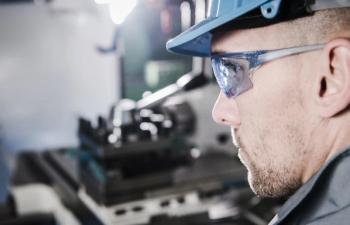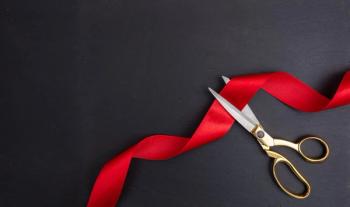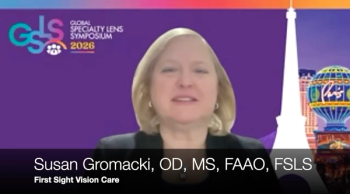
Defining success: Is more better?
“Typically, (Roellinger) listens to the sound of the bread, not the cash register. It’s because he’s a ferocious advocate for the glory of tiny, individually owned and operated producers. The idea that one should-no, must-keep it small.”
The views expressed here belong to the author. They do not necessarily represent the views of Optometry Times or UBM Medica.
About six months ago, I was cleaning the house on a Saturday with the TV on. I often do this, just casually taking in whatever cooking or redecorating show is on at the time. It’s where I get some of my best and worst ideas. (My fiancé will attest to that because he has been roped into a number of “quick” home improvement projects that ended up consuming his life.) But I digress.
On this day, one of my favorite travel and cooking shows was on:
More blogs:
I have to realize all of my dreams
On this particular day, he was traveling in Brittany, France. Brittany is known for a dramatic coastline, proud tradition, and culinary wealth. The locals are extremely proud of their region, and although I’ve never been there, it would seem that this is for good reason. The shots of the coastline were gorgeous, the countryside was pristine, and there were occasional shots of forest as well. It looked like a beautiful and largely untouched piece of French paradise.
The episode starts with Bourdain traveling with a gentleman named Olivier Roellinger. Roellinger is a chef in Brittany and has an interesting past, having recovered from a terrible and tragic incident. He had been beaten, left in a coma, and subsequently was in a wheelchair. He overcame his injuries, eventually regaining the ability to walk. Despite his misfortune, or perhaps because of it, Roellinger has developed an inspiring attitude and outlook on life.
Early in the episode, he states, “I have to realize all of my dreams.” This is where I was transfixed. What an inspiration, a man who was savagely beaten for no reason (although, I’m not sure there’s ever a reason to be savagely beaten), recovered and came through it with the most incredible attitude-that he must experience it all, he must live his dreams, and he must realize every one of them.
Roellinger shows Bourdain his restaurant and his small bread shop where all the bread for his restaurants is freshly made. When in the bread shop, Roellinger is proudly discussing the bread, tapping it, and listening for a distinctive sound that indicates it is good. If it doesn’t sound that way? Well, then it isn’t good enough to be served.
Bourdain chimes in via voiceover: “Typically, (Roellinger) listens to the sound of the bread, not the cash register. It’s because he’s a ferocious advocate for the glory of tiny, individually owned and operated producers. The idea that one should-no, must-keep it small.”
Bourdain then asks Roellinger if he has considered getting another machine so he can produce more bread. The idea is discussed, and Bourdain acknowledges that Roellinger would be able to greatly expand his business if he chose-the bread is that good. But Roellinger resists, stating that you forget about the quality if you are trying to make a lot, a lot, a lot. “We don’t have the obsession to make always more and more.”
We need more time
So, what does this have to do with optometry?
Increasingly, it would seem that the patient care environment is such that we are being pushed to produce more and more. Exams, refractions, and every other service can be commoditized. Reimbursements are down, so patient volume must go up. And it’s not just optometry. Rick Donahue, MD
He discusses the primary-care environment, stating, “Even in Boston, the mecca of medicine, patients struggle hard to find an accessible doctor. And when they finally land an appointment, their well-intentioned internist, pediatrician, or family physician often seems overworked, rushing from patient to patient, with little time to really listen to details.” He goes on to advise more time with patients-more listening to their stories, less rushing to get to the next person.
More blogs:
Unfortunately, the current environment in health care says, “If you saw 12 patients yesterday, let’s see if you can see 14 today.” What if you could see 20-or 40? Would that be better? If you spent 15 minutes with your last patient, should you shave it down and spend 10 with the next? Can you get by with one exam room, or would it be better if you had six?
What are we accomplishing by doing more and more? We’re seeing more patients-are we taking the best care possible of them? Maybe yes, maybe no-that probably depends on the doctor.
Is growth the goal?
In the recent business book,
More blogs:
We always want to know how growth is coming along. It’s how we set our goals, it’s how we reimburse and bonus our staff. Did you do better than last year monetarily? If so, you get a bonus. But do we have to grow to be successful? If I provide amazing care to my patients and produce the same amount every year, am I still a success? If I am able to counsel a patient to stop smoking or to change his diet, is that a success? It didn’t necessarily make me any money, but I made a positive change for that patient. How do we put a value on that type of care?
Godin discusses the fact that he could have grown his business, but he has intentionally held it back to preserve its integrity. Do we dilute our brand the bigger we get?
Getting off the hamster wheel
Roellinger, Donahue, and Godin bring up valid points. Instead of remaining hamsters running until we are breathless on a wheel that will never stop, what if we get off and say, “No”? What if we say, “I will dictate the care I give each and every day”? Our time and full attention is what our patients need.
I know I’m being idealistic. As I work to set up my own private practice, I can’t help but be. I fully recognize that I have colleagues who see 50 patients per day and give their all to every single one of them. I know that I personally couldn’t do that, but more power to the docs who can. I think we all can and should ask ourselves honestly what our goals are. Must we grow? Must we go faster? Am I a better doctor if I see 25 patients tomorrow while you see 20?
More from Dr. Denton:
Instead, what if we treated our patients like Roellinger treats his bread? Each loaf gets a loving tap and special attention. Each patient is thoroughly listened to, examined, and cared for. Roellinger could make more bread, but he doesn’t because he prefers to be obsessed with quality. He listens to the sound of the bread, not the sound of the cash register. Should we do the same?
Newsletter
Want more insights like this? Subscribe to Optometry Times and get clinical pearls and practice tips delivered straight to your inbox.















































